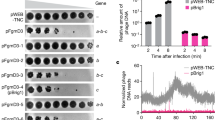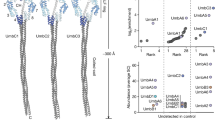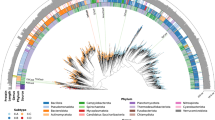Abstract
GENERALISED transduction—the transfer of bacterial genes from one cell to another via bacteriophages—is one of a small number of processes by which bacteria can acquire exogenous genetic information. Transduction was first demonstrated in Salmonella typhimurium with the phage P22 by Zinder and Lederberg1,2 and subsequently in Escherichia coli with the phages P13 and T14. Bacteriophage T4 is the largest, and one of the most thoroughly studied of the virulent coliphages but has never been observed to mediate generalised transduction. In this report we describe a multiple mutant of T4 that displays the property of generalised transduction, and transfers E. coli genes with frequencies that, in general, are higher than those observed for other transducing phages.
This is a preview of subscription content, access via your institution
Access options
Subscribe to this journal
Receive 51 print issues and online access
$199.00 per year
only $3.90 per issue
Buy this article
- Purchase on Springer Link
- Instant access to full article PDF
Prices may be subject to local taxes which are calculated during checkout
Similar content being viewed by others
References
Zinder, N. D. & Lederberg, J. J. Bact. 64, 679–699 (1952).
Susskind, M. M. & Botstein, D. Bact. Rev. 42, 385–413 (1978).
Lennox, E. S. Virology 1, 190–206 (1955).
Drexler, H. Proc. natn. Acad. Sci. U.S.A. 66, 1083–1088 (1970).
Snyder, L., Gold, L. & Kutter, E. Proc. natn. Acad. Sci. U.S.A. 73, 3098–3102 (1976).
Wilson, G. G. et al. Molec. gen. Genet. 156, 203–214 (1977).
Bachmann, B. J. et al. Bact. Rev. 40, 116–167 (1976).
Rodriguez, R. L. et al. Miami Winter Symp. 13, 73–84 (1977).
Shapiro, J. A. in DNA Insertion, Elements, Plasmids and Episomes (eds Bukhari, A., Shapiro, J. & Adhya, S.) 630 (Cold Spring Harbor Laboratories, New York, 1977).
Streisinger et al. Proc. natn. Acad. Sci. U.S.A. 51, 775–779 (1964).
Depew, R. E. et al. Virology 64, 144–152 (1975).
Snustad, D. P. & Conroy, L. M. J. molec. Biol. 89, 663–673 (1974).
Snustad, D. P. et al. J. Virol. 17, 622–641 (1976).
Sirotkin, K. et al. Nature 265, 28–32 (1977).
Ikeda, H. & Tomizawa, J. I. J. molec. Biol. 14, 85–109 (1965).
Ebel-Tsipis, J. et al. J. molec. Biol. 71, 433–448 (1972).
Chow, L. T. & Bukhari, A. I. in DNA Insertion Elements, Plasmids and Episomes (eds Bukhari, A., Shapiro, J. & Adhya, S.) 295–306 (Cold Spring Harbor Laboratory, New York, 1977).
Wood, W. B. & Revel, H. R. Bact. Rev. 40, 847–868 (1976).
Author information
Authors and Affiliations
Rights and permissions
About this article
Cite this article
WILSON, G., YOUNG, K., EDLIN, G. et al. High-frequency generalised transduction by bacteriophage T4. Nature 280, 80–82 (1979). https://doi.org/10.1038/280080a0
Received:
Accepted:
Issue Date:
DOI: https://doi.org/10.1038/280080a0
This article is cited by
-
Lytic and genomic properties of spontaneous host-range Kayvirus mutants prove their suitability for upgrading phage therapeutics against staphylococci
Scientific Reports (2019)
-
PpiD is a player in the network of periplasmic chaperones in Escherichia coli
BMC Microbiology (2010)
-
High-frequency phage-mediated gene transfer in freshwater environments determined at single-cell level
The ISME Journal (2010)
Comments
By submitting a comment you agree to abide by our Terms and Community Guidelines. If you find something abusive or that does not comply with our terms or guidelines please flag it as inappropriate.



